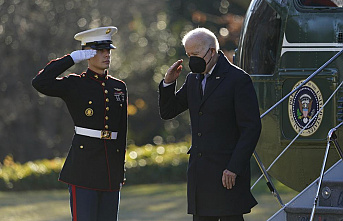After only a brief heads-up from the president's staff on Sunday, the brazen announcement by the West Virginia senator could derail Biden's "Build back Better Act." It also raises new questions about whether voting rights legislation will be passed and other important bills that would need his vote in the 50-50 Senate.
Republicans praised Manchin's bravery in joining all GOP senators to stop Biden from implementing his big climate change and social services package. Progressive Democrats vilified Manchin mercilessly as a deal-breaker who didn't keep his promise, and even moderates poured on the criticism after months of negotiations. The discussion also included the question of whether the senator, a lifelong Democrat is now making a break with his party.
"We knew he'd do this," tweeted Rep. Alexandria Ocasio Cortez, D.N.Y. Rep. Pramila Japal, Washington state's leader of House progressives, stated that Manchin cannot say "he is a man after his word" anymore.
"If he lacks the courage to do right for the working families in West Virginia and America let him vote no before the whole world," Senator Bernie Sanders, an independent from Vermont, stated on CNN.
The next steps for Congress are uncertain after it was rescheduled for the Christmas holidays. Although it seemed unlikely, some Democrats wanted to recall the Senate to session in order to force a vote. Others quickly got to work, trying to win Manchin's support again and picking up pieces that one aide described as a "jigsaw puzzle" thrown on the floor. Biden's reputation for being a skilled deal-maker was in balance.
Nancy Pelosi, House Speaker, tried to strike a positive chord by assuring House Democrats that an agreement could still come out in the new year. Pelosi did not denounce Manchin's statement on Sunday night. She didn't name him in her statement. Instead, she encouraged her caucus members to emphasize the measure's effect on constituents and "barnstorm" the nation over the coming weeks.
Pelosi stated, "It is crucial that American families understand how this once in a generation investment in infrastructure will enhance their lives."
Jen Psaki, White House Press Secretary, responded with unusual severity to an inquiry from a lawmaker who had been personally courted and whose vote was crucial.
Psaki stated that he would continue to press him to find a way to change his position, honor his commitments and keep his word.
Manchin stated that, after nearly five-and-half-months of negotiations between Democrats, "I can't vote to continue with this piece legislation."
Manchin stated, "I can't get there."
Manchin was firm in his opposition to the bill, but his words regarding this particular bill seemed to open the door for continued discussions with Biden and other Democrats about reshaping it.
The West Virginia senator said that the bill would not die unless it meets his demands for a smaller package. This would be difficult for many Democrats in narrowly divided Congress to agree to, even though they had other options.
Senator Patty Murray (D-Wash.), a member in the party leadership, stated that her fight for the bill's full benefits "will not cease until it's on President's desk."
This package would be worth hundreds of billions of dollar to millions of families, creating free preschool and strengthening child care aid. It would increase federal subsidies for health insurance, and expand Medicaid access in those states that have not yet done so.
More than $500 billion is available for spending and tax breaks to reduce carbon emissions. Manchin negotiated many key provisions that experts consider the highest federal expenditure ever made to combat climate change.
Other provisions would reduce prescription drug price rises, provide hearing benefits to Medicare recipients, and boost aid for the elderly, housing, and job training. It would almost all be covered by higher taxes on the wealthy, large corporations, and other income.
Biden's party faces a new deadline with the expiration on an expanded child credit. This credit has been sending $300 per month directly to millions families' bank accounts. The money will not arrive in January if Congress fails to act.
Negotiations between Biden and Manchin broke down this week after months of negotiations. This is a sign that there will be no year-end agreement, despite the fact that they had been in talks for many months.
In her statement, Psaki stated that Manchin had given Biden "in person" a proposal for the bill last Tuesday. It was "the same size" and "the exact scope" as the framework that Democrats supported in October. He agreed to continue negotiations. The framework was estimated to cost $1.85 trillion over a period of 10 years. Officials had not previously made public the Tuesday meeting.
Although there are many different stories about what happened next, the conversation didn't go as planned. According to one person who was privy to the talks, Manchin's idea of cutting child tax credit led to heated discussions. To share details about the talks, the person requested anonymity.
The Associated Press reported previously that Biden and Manchin had moved further apart.
According to a source familiar with the actions of Senator Manchin, the White House received a notice from Manchin's aide about 20 minutes before the lawmaker made his announcement on national television.
Manchin's declaration was an astonishing repudiation of Biden and his party's top goals, calling back to the famous thumbs down vote by Senator John McCain (R-Ariz.) that ended President Donald Trump's 2017 attempt to repeal the Obama-era health care law. While there are other problems with Biden’s package, which were caused by Arizona Sen. Kyrsten Silnema (a moderate Democrat), Manchin's stand outs.
South Carolina Senator Lindsey Graham was the top Republican on Senate Budget Committee and had spent many weeks trying to get Manchin to oppose the bill. He said that he appreciated Manchin's opposition.
Many consider a rejection of the legislation unthinkable due to the potential political damage it could cause Democrats, especially ahead of next year’s midterm elections when their control over Congress is in doubt.
"Failure cannot be an option," stated Rep. Suzan DelBene (D-Wash.), who reiterated the desire of moderates to see the bill refocused towards fewer programs.
Manchin stated that he opposed the $10-year bill, which is approximately $2 trillion in value, due to his concerns about inflation and growing federal debt. He also said that he needed to concentrate on the omicron COVID-19 version.
He also wants the bill’s initiatives to be valid for the full 10-year period. But that's a high order. The Democrats made many of the temporary to keep the overall bill's price tag close to Manchin's.
Democrats reject Manchin's claims that the bill will fuel inflation and worsen deficits. They claim that the bill's job training, education, and other initiatives will spur economic growth and reduce inflation over time.








